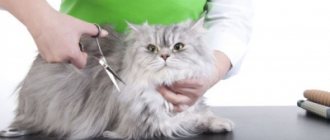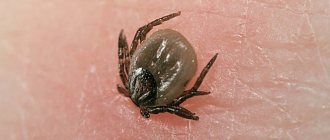Often the decision to adopt a cat arises spontaneously. It's hard to pass by a cute baby who trustingly rubs his feet. It’s hard to resist the sight of a plaintive little lump that you want to fatten and caress. Let's figure out what to do if you pick up a kitten from the street, what first steps you need to take to care for a potential roommate.
Unfortunately, for people who do an impulsive act, a holiday can turn into a tragedy. Viruses, parasites, unprepared housing - without proper care, all this can end the life of a pet.
What to do with a street kitten first
If you pick up a kitten on the street, but cannot immediately contact a veterinarian, you need to create the best conditions for it at home.
- Give your pet a place where he can get used to the apartment. Cats love to hide in unfamiliar places.
- Your task is to provide your pet with a comfortable shelter, such as a box. The main thing is not to give the opportunity to climb into hard-to-reach places. Common injuries among kittens are being crushed by objects: a door or a folding sofa. Attention and isolation of the animal will help here.
- Teenage kittens and adult outdoor cats often become victims of heights. An open window or balcony is extremely dangerous for curious animals with no fear of heights. The excitement of the hunt and curiosity can be a disservice.
- Folding transoms are also dangerous: not a single animal has died after getting stuck in the ventilation systems. If there are no special bars on the windows (a mosquito wall will not work), it is better to close the windows. If the room is ventilated, close it.
The ideal option is to immediately take your cat to a veterinarian. There she will be examined, her age will be approximately determined (in order to prescribe the correct medications for parasites), her gender, her temperature will be measured, she will be weighed, and she will be prescribed preventive vaccinations. If globulins against panleukopenia, a dangerous viral disease, are available, the kitten should be vaccinated without hesitation.
In the new premises, it is necessary to install a toilet. As far as possible from him - a bowl of water and food. If the cat doesn't eat, leave it alone. On the street, the kitten is used to eating alone and on the sly.
Possible diseases of street cats
Fleas and worms are just the most common problems for stray cats. In addition, they may have other diseases that are not dangerous to humans, but require special treatment:
- Otodectosis is an infection by a microscopic scabies mite. A person cannot become infected with otodectosis, but the disease can be transmitted to other pets: cats, dogs, rabbits, ferrets. Signs of infection include black earwax and the formation of black crusts on the pinna of the ear. If they are detected, you should contact a veterinary clinic, where the animal will be given an accurate diagnosis and treatment will be prescribed.
- Viral diseases are most often seasonal; street cats become infected with them in the spring and autumn. Kittens are the most defenseless against viral infections. If a cat taken from the street is sneezing or coughing, or has watery eyes, diarrhea or vomiting, it is likely infected with rhinotracheitis, calicivirus or panleukopenia. In this case, you need to show the animal to a veterinarian as quickly as possible. Sometimes delay can be fatal, as the kitten may die due to the rapid development of the disease.
- Infection with protozoan microorganisms - lamblia, isospores, which cause digestive disorders. A stool test is performed to identify parasites. Medicines for worms do not work on them; only a specialist can prescribe effective treatment.
We talked about diseases that cats can have, but this does not mean that every street animal is infected with them. Therefore, for fear of such infections, there is no need to deprive a stray cat of the chance to become a pet. Moreover, most cat diseases are not transmitted to humans.
What to feed a stray cat from the street
First of all, the new owner, who picked up the kitten on the street, wants to fatten it. Such “nutritional acquaintance” will instill trust in the animal. From the gastronomic abundance you can use:
- Any industrial food, depending on the condition of the teeth - dry or wet. If there is no wet one, you can soak the dry one in water.
- Meat baby food, baby cottage cheese without salt or fillers.
- Chopped meat of chicken, turkey, rabbit, as well as beef, boiled or raw (scalded with boiling water).
It is undesirable to give pork, but raw pork is not allowed: it can be a source of toxoplasmosis.
In addition, pork contains the enzyme thiaminase, which destroys vitamin B1. It is destroyed by heat treatment, but fried meat is not suitable food for a kitten.
Operation "clean hands"
Professional volunteers call the animal’s new owners “handles.” It is difficult to predict how long it will take to find good “handles”.
“Purebred dogs settle in very quickly (as a rule, but there are exceptions); for a purebred dog, finding an owner can take several months or more. Try to find helpers, recommends Anastasia Shukaeva. – There are online resources that will be useful to you.
On these sites, go to the forum section and create a topic about the found dog: describe its breed or characteristics of the breed (color, shape of the muzzle and ears, height), gender, approximate age, health condition and the situation in which you found the animal. Try to include a photo. Describe what you need help with (finances, transportation, anything else). There are a lot of caring people, and those who can help you will probably respond.”
Exhibitions for homeless animals are also a way to find accommodation. Not only shelters bring pets to such an exhibition - a private owner who has found the animal and is trying to find a new home can also exhibit a dog or cat.
How can you be sure that the person who comes to you for a dog is really its owner? “The owner must have documents for the dog and the cat. He must know some special signs,” says Oksana Dubinina. “Also, I think he should be moved at the sight of his beloved pet.” And the owner must have photographs of the animal. Plus, it is important to look at the dog’s reaction upon meeting. How joyfully does the dog greet this person, does he recognize him as his owner?”
When you show the dog to potential owners, be sure to clarify the conditions in which it will be kept, what they plan to feed it, how long they stay at work, and whether they have other animals.
“After a dog has moved to a new home, be sure to keep in touch with its new owners. A phone call will be enough to find out if everything is in order (a week after the move, then a month later and again after six months). Sometimes dogs get adopted on the very first day after the announcement is published, sometimes you need to wait,” advises Anastasia Shukaeva.
Get rid of fleas
Determine approximately how many months the kitten is and treat it with a suitable product. The price of the drug does not matter. Keep in mind: expensive, cheap and simply popular drugs are often counterfeited. You can check with domestic manufacturers whether the retail outlet is part of the network of official suppliers, and if in doubt, call the hotline and find out whether the company produced a specific series.
Note that veterinarians advise conducting an initial examination before washing a street kitten - perhaps after water procedures, one of his diseases, for example, lichen, which is not visible to the eye, will worsen.
If the kitten needs to be washed, choose a flea shampoo. If bathing is not necessary, use drops. A day or two after treatment, you need to select and give an anti-worm drug to a kitten from the street based on weight and age, and repeat after 10 days.
Suitable medications are those that act on the larval forms of Toxocara, the most common helminth in Russia. For the first treatment, a combined preparation is selected in the form of drops on the withers. It will free your pet from fleas, ear mites and most helminths. Then you need shampoo without an anti-flea component.
To get along in character
Photo from the website sputnik.md
In order to find new owners for a dog, these owners need to first know about it.
Submit advertisements. In newspapers, magazines, on ad sites on the Internet, on bulletin boards at entrances. Finally, post advertisements in nearby areas.
“Try to imagine: what kind of owner would be suitable for your ward, who is this person, what does he do and what newspapers (websites, magazines) does he read? For example, if you find a calm small dog, then it can be a faithful friend for older people. Accordingly, advertisements should be submitted to newspapers that are popular among pensioners (these are free regional newspapers, newspapers with a TV program for the week (“Antenna”, “TV program”, “KP”), advises Anastasia Shukaeva , a volunteer at animal shelters with extensive experience in adoption animals.
– If you found an active young dog, then perhaps she was (or will be) a joy for people living outside the city. Submit advertisements in newspapers near Moscow or simply post them at commuter train stations. Or she can find her home in a family of young people - then advertise on the website avito.ru, on the vkontakte.ru network and on other Internet resources. Universal newspapers (those that are read by almost everyone) are Komsomolskaya Pravda and the Metro newspaper.”
We are installing the foundling. Instructions
- Shelters do not accept puppies because : 1. Puppies require special care; 2. Puppies, most likely, simply will not survive;
- What to do : 1. Look for foster care where they will take you for a fee or free of charge; 2. Look for owners.
- What you need for this : 1. Take good photographs; 2. Write a text about the dog\puppy\cat\kitten (age, character, perhaps a story about how you found the animal). Indicate that you cannot keep the animal (for whatever reasons), that you need help finding the owner or temporary foster care. 3. Leave your contacts. This can only be a link to your page, or maybe also a phone number (at your discretion). For some people, for example, it’s easier to write than to call. 4. Write to the administrators of large animal protection groups with a request to place your ad (text and photo). 5. If there is a person who is ready to help, do not be lazy and talk to him. Anything can happen... including bad intentions.
Get vaccinated
Vaccinate a kitten picked up on the street only 14 days after the meeting. Before this, it is important to exclude contact with other animals and carefully monitor his condition.
Kittens from the street and especially from the poultry market often have a dangerous virus - panleukopenia. This is a serious disease that can kill a cat in less than a day. Treatment is expensive and time consuming.
Other infections are calicivirosis and rhinotracheitis. If you visit a veterinary clinic in a timely manner, you can choose a therapy that can successfully treat the disease. When the kitten is already lethargic, it is much more difficult to help.
To protect a kitten from panleukopenia or, in any case, from the fulminant and acute forms of this disease, when the pet was cheerful in the morning but cannot get up in the evening, it is necessary to administer globulin for cats. It contains ready-made antibodies that will help the immune system cope if infection has already occurred.
This vaccination does not guarantee that the animal will get sick, but it will protect against severe types of the disease. Comprehensive vaccination, including rabies, can be done after 2 weeks. Quarantine will take just that long, during which vaccination is contraindicated.
First steps
Photo from the site danlik.ru
So, you have made the responsible decision to pick up a stray dog or cat and help the animal find a new home. What to do first?
Try not to worry yourself and calm the animal.
Make sure that the animal is not a lost animal being sought by loving owners, or stolen. “What needs to be done is to see if there is an address tag on the collar (if there is a collar, of course), if there is a stamp, and then at the veterinary clinic to check if there is a clip-chip. Then place an announcement about the find on specialized websites, advises Elena Isakovskaya , volunteer and owner of a private animal shelter. – If you are sure that the animal is a former pet, you need to write a statement about the find to the police within three days. If the owners are subsequently found, they are obliged to reimburse you for all costs of maintaining their pet. But if there is no statement about the find, you may be accused of theft.”
If you have the impression that the dog is lost, follow the advice of the site If you found the dog.
Very often, animals are thrown away as soon as they have the slightest health problem. Assess the animal’s health: external condition, behavior, motor activity, breathing. A healthy dog is alert and active. She has a good appetite, smooth and shiny coat, mucous membranes are pink and moist, her nose is cold and moist. If the dog's condition gives you concern, it is advisable to take it to the doctor.
When choosing a stray animal, you must understand: you will probably need money for veterinary care. “Very important: when transferring an animal to new owners (and sometimes old ones), you will have to sterilize it. Unsterilized animals are not accepted!” – Oksana Dubinina notes an important point. So weigh your financial capabilities before giving in to the impulse of pity.
Do not allow contact with other animals
If there are dogs at home, they should not come into contact with the new pet and its litter box until treated for parasites. Cats should not come into contact with an outdoor kitten for at least 14 days, especially if the animals are not vaccinated against the most common feline diseases.
It is ideal to give the kitten and other cats in the house a blood test using PCR for “slow” viruses - leukemia, peritonitis and immunodeficiency. If at least one test of a new pet is positive, and your pets do not suffer from it (or vice versa), it is better for the baby to find new owners.
Abandoned Angel
Very often people come to us with questions about what to do when an animal is on the street. This article provides answers to frequently asked questions.
FIRST RECOMMENDATIONS FOR ACTION WHEN DETECTING A DOMESTIC LOOKING ANIMAL ON THE STREET:
1. Take the animal from the street. If a dog or cat looks domestic (more or less clean, well-groomed, with a collar or trace of it, runs up to people, looks for an owner, etc.), you may find its old owners who are really looking for it and waiting for it, and even We are ready to give you a reward for the return of your pet! If the animal looks homeless (perhaps it was lost a long time ago or was abandoned by unscrupulous owners), remember: you have the power to give it a chance to live in a new home with loving owners! According to statistics, almost any homeless animal can be adopted into good hands within a period of time from a week to six months (of course, provided that you engage in so-called “PR”, i.e. place ads with a good photo of the animal on resources).
You should not leave an animal on the street, especially if it is clearly domestic, clearly weakened or sick. Firstly, this could result in death for him, and secondly, the animal could leave in an unknown direction. And after this you (perhaps) will reproach yourself for the fact that you could have saved someone’s little life, but did not.
What to do next?
a) If there are no animals of your own, then there is accordingly no need to isolate the found animal.
b) If your animals are vaccinated, isolate the foundling, even in the kitchen, even in the pantry, even in the bathroom. Remember that even vaccination does not provide a 100% guarantee of non-infection, so try to avoid contact between pets and the foundling!
c) If you have your own animals, but have not been vaccinated/vaccinated for a long time, beg your friends, parents, relatives, neighbors, ex-husbands/wives to hold the animal for a couple of days.
You can also search for “overexposure” on animal protection resources. Volunteers can help you with the temporary care of an animal for free or for a fee (depending on your luck), although free foster care is usually difficult. Many believe that in our city in particular and our country in general there are organizations that should deal with the fate of animals on the street. Yes, like in developed countries, we should have such organizations, but in reality we only have catching, in which all animals will eventually be euthanized! And animal protection organizations (shelters, charities) and volunteer forums help animals privately, exclusively with the money of sponsors, who are often the volunteers themselves. Therefore, please do not call shelters or write on forums “There is a sick dog/cat living on the street! Someone take her, otherwise I feel sorry for her!” Do not shift responsibility for the fate of the animal onto someone else's shoulders! If you have already picked it up, then take part in the further development of the pet’s life, do not abandon it! Volunteers will help with advice on how to place an animal and how to choose owners. So, let’s say that you couldn’t get past the “lost” or “homeless” and took him home. What to do next?
2. Try feeding the animal. You should avoid dairy products, raw meat, fatty foods (for example, sour cream, fried meat, sausage should not be offered). Something neutral is best. At least the same thing that your animals eat (if you have them). Start feeding with small portions, but every 2-3 hours, gradually increasing both the portion and the feeding interval. Don't forget about water. Refusal of water/food should alert you. In this case, go to point 3.
3. If the animal looks sick, contact your veterinarian. To do this, open Double-GIS and select a trustworthy veterinary clinic. Next, put the animal (cat) in a carrier or, if it is not available, in any bag, or put on a collar and leash (on a dog) and go to your nearest/preferred clinic. After the visit, the carrier/bag/collar/leash will need to be treated with a disinfectant that is safe for animals, for example, such as Ecocide S or Virkon S (BUT NOT BLEACH!) Now many veterinary clinics are open 24 hours a day, but it is always better to call in advance to ensure that you are there when you arrive. in the doctor's place. Be sure to ask to write down all appointments and presumptive diagnosis. Be sure to mention if you gave the animal serum. If you know for sure that you cannot leave the animal at home, veterinary clinics have the opportunity to leave the animal for a while, but this is definitely paid! But at least you can leave him there for a day/half a day while you look for temporary foster care among your friends. You can also look for foster care or financial assistance for the treatment of a foundling on resources.
HOW TO SEARCH FOR THE OLD OWNERS OF A FOUND ANIMAL:
So, you took the animal from the street and now it is not in danger of being run over by cars or dying of hunger. If by all indications you decide that the animal is simply lost and not homeless, you must make an effort and try to find its old owners! The following tips will help you with this.
Carefully inspect the animal for identification marks! This could be the owner's phone number or an address tag on the collar, a brand (in the ear or groin) or a chip, the presence of which can only be determined in a veterinary clinic. If you find a brand (tattoo in the form of numbers and/or letters), it makes sense to search the Internet for a database of brands, which can be used to determine the club/kennel to which the animal belongs. Breeders usually save the contact details of the people to whom they sold a particular pet. The surest and most effective way to find the old owners of a “lost property” is to post paper advertisements in the area where it was found. Pillars, bus stops, shops, entrances of houses, pet stores and other public places where people gather are the best places to post advertisements. Remember: advertisements need to be posted REGULARLY, because... they are picked almost every day or two. If possible, print an ad with a photo of the animal - this will make it easier for people to remember it, and for owners to recognize their pet! Posting advertisements is especially effective when finding CATS, because... According to statistics, lost cats do not run far from home/place of loss, which means you have a much greater chance of finding its owners exactly where you found the cat itself! Look at the announcements about missing animals recently and advertise the find yourself in the media. If you do not immediately find an advertisement on any of these resources about the loss of the animal you found, this does not mean that they are not looking for it! Perhaps the owners, in a state of panic, are simply combing the surrounding area and haven’t even thought of posting advertisements anywhere yet. Look through newspapers, Internet sites, forums, and our file cabinet regularly - perhaps the owners will post a missing person notice after a week or two. Don’t forget to submit advertisements about your find on all of the indicated resources.
ATTENTION!!!
The “bloody business” of animals is quite widely developed in the city - in markets and squares you can always see resellers (BOXERS) selling animals in cardboard boxes and often passing off mestizos as purebreds in order to rip off more money from the buyer.
DON'T TRUST THEM!!!
DO NOT GIVE YOUR FOUND ANIMALS TO REALTERS!!! BELIEVE HE WILL HAVE PRACTICALLY NO CHANCE LEFT TO SURVIVE!
WHAT TO DO IF YOU FOUND AN ANIMAL ON THE STREET THAT IS NOT A PET (OR THE PREVIOUS OWNERS COULD NOT BE FOUND)
Unfortunately, there are a huge number of stray animals on the streets of the city. Some of them are former pets and sometimes they manage to find owners, but there are cases when this is not possible (or the former owners do not need the animal). Follow all the steps mentioned above and read the information below.
Unfortunately, there are a huge number of stray animals on the streets of the city. Some of them are former pets and sometimes they manage to find owners, but there are cases when this is not possible (or the former owners do not need the animal). Follow all the steps mentioned above and read the information below.
FIND A SUPPORTER
A foster home is a temporary home, a place where your ward will live until permanent owners arrive. Where and how to look for foster care:
- In my apartment. This is an ideal situation. If you have unvaccinated pets at home, then for the first time it is better to isolate the “matched one” in another room/kitchen/bathroom. — In the house of relatives, friends, work colleagues, etc. Interview all your friends, offer them your help in caring for the animal and/or a reward. Think about janitors, concierges, pensioners who feed animals in the yard - a little extra money won’t hurt them, and the animal will be close to you. — In hospitals at veterinary clinics. A hospital is especially useful if the animal is sick and needs constant medical care. But don’t rely too much on this option: hospitals may not take animals from the street to avoid infections. There is also the other side of the coin - in veterinary clinics there is a large flow of animals that can infect your patient. And the cost of overexposure in a hospital starts somewhere from 500 rubles/day. - In hotels for animals and in private foster care - their coordinates can be found in advertisements in newspapers and on the Internet. The disadvantage of hotels is that they are too expensive and they, as well as in hospitals, do not want to accept unvaccinated dogs and cats from the street. The disadvantage of private foster care is the danger of meeting unscrupulous people. It is advisable to find a foster home with good reviews. Be very careful, check the condition of your ward every day in the foster care facility with strangers. — On forums and online communities for helping animals. Despite the fact that the likelihood of finding a free foster home is not very high, suddenly you will be lucky and a temporary “living space” will become available for one of the forum members or their friends. You can also find paid foster care there, if it’s not free.
Wherever you find a foster home, remember: this is just a place where your animal is temporarily kept. You, and not the owners of the overexposure, bear all responsibility for its arrangement. Moreover, strictly discuss with them that only you can give the animal to new owners; there should be no initiative on their part. This is especially true for overexposures found through advertisements.
Please do not try to “surrender” a found animal to city shelters! They are ALL overcrowded several times over and they themselves can barely cope with feeding, caring for and treating the animals that they already have in their care. Please understand that in our city there is NO municipal support for shelters - most shelters are private organizations and exist ONLY on the salaries of their leaders and donations from volunteers and a few sponsors and benefactors. Therefore, when trying to place an animal in a shelter, you are literally placing on the shoulders of others, who are already overloaded, something that you can perfectly handle INDEPENDENTLY, if only you wish.
Under no circumstances should you give your animal to strangers with a promise to house it for your money!!! Don’t be fascinated by sentences like “I will take and place any dogs/cats in good hands”, “The shelter will accept animals”, etc. Do not hand over animals to people in markets and near the metro who sell kittens and puppies. All these are resellers!
While the animal is in foster care and you are looking for owners for it, it would be a good idea to sterilize it. This procedure will make the animal problem-free for future owners, freeing them from the need to place offspring or stuff the pet with hormonal pills during the rutting period (which will greatly harm its health). In addition, this will protect the animal in the future from replenishing the ranks of homeless animals with its descendants if it ends up on the street again (for example, gets lost) - at least, if the cat/dog becomes homeless again, it will not bring cubs that would also were doomed to a miserable existence.
SEARCHING FOR OWNERS!
Once a foster home has been found, you can finally start looking for real, permanent owners.
Tell your friends about your “chosen one”. Ask them, in turn, to ask their colleagues, relatives, neighbors, etc. Use the “Tell Friends” function if you communicate on social networks. Perhaps you will not need to give the animal to strangers through an advertisement if among your friends, through word of mouth, there are people who want to have a pet. However, if you are constantly involved in adopting animals, and everyone you know is already petty and special, then read on.
Take good, so-called “PR” photographs to place in print and electronic advertisements. This is the most important part of advertising, which determines how quickly your foundling will find a home. Remember: the supply of animals is many times greater than the demand for them, so the competition for potential owners is simply enormous! People are visual people, they love with their eyes, and no description can replace a picture of an animal, while a good photo will always attract attention, even in the complete absence of text. If you place ads with blurry, dark or overexposed photos taken on your phone, and even from a bad angle, you will simply be wasting your time. Take this point seriously. If you don’t have a camera, or you can’t take a high-quality photo, you can turn to photo assistants for help and find them through social networks.
DRAFTING AN ADVERTISING TEXT
Compose the ad text indicating all the information you have about the animal: nickname (even if temporary - it will help personalize the pet in the eyes of potential owners), age (at least approximate), color, size (this is important for dogs), health (presence /lack of vaccinations, sterilization, treatment for parasites), toilet training (tray/walk), character, dating history. In this case, the text should be short enough and touching. Be sure to provide contact numbers.
Incorrect presentation of the text: “I’ll give away a ginger cat, I picked it up on the street”
Correct presentation of the text (approximate): “The PURRING cat Alice, a beautiful red-striped color, young and playful, is looking for a responsible owner. Treated for fleas and worms, vaccinated, sterilized. Trained to use the tray and scratching post, she is not picky about food. She is very affectionate and smart, loves to sit on her lap and play with a string. Rescued from a pack of dogs that chased her up a tree. Having several of your own animals does not allow you to keep them. Tel. 8-9ХХ-ХХХ-ХХ-ХХ»
After the “PR” photos and text are ready, the main, most routine part of the device begins - posting advertisements (or “PR”, as they say in animal protection circles). Printed advertisements in public places, in pet stores, in newspapers, advertisements on the Internet on electronic bulletin boards, thematic forums and websites, on social networks, etc.
Remember an important rule: PR must be active and regular, otherwise it will be of no use! Printed advertisements need to be posted almost every day (well, at least every other day), because... they are torn down, advertisements in newspapers must be submitted every week so that they appear in the next issue, topics on forums must be unsubscribed at least once every few days, advertisements on electronic bulletin boards (such as Avito, etc.) must be “raised” (either paid, depending on the site, or deleted and resubmitted after a few days), otherwise, due to the large flow of advertisements, they go to the very last pages.
Therefore, keep in mind: if you once placed ads on two or three resources, and then abandoned this matter and hoped that “maybe it will work,” I hasten to disappoint you. PR is a matter that requires regularity. But how nice it will be later when you see the happy face of your ward in the new home! If you simply do not have enough time to engage in active PR, you can ask for help on the forums.
If you have conscientiously completed all the previous steps, potential owners should call you. But don’t rush to give your pet to the first person who calls! Nowadays, you can run into very cruel people (resellers, sadists, etc.), to whom you should never give a living creature. How to choose the right responsible and loving owners for an animal - read on.
Rules for choosing good hosts:
When they call you, don’t be shy and ask everything that interests you, even if the conversation drags on. Otherwise, you will find out something important when it is too late, and, at best, you will lose your time, and at worst, you will give the animal to unscrupulous people. You must not only answer the callers’ questions about your ward, but also learn the following from them YOURSELF:
How old is the caller? There are situations when children and teenagers call who decide to get an animal without parental permission. Also, sometimes very old pensioners call - they are sad to live alone and want to get a pet. When adopting a young animal, keep in mind that dogs live 10-15 years, and cats up to 20 years. What will happen to the pet if it outlives its elderly owner? Will the pensioner’s children kick him out of the house, as often happens? Think about this question yourself and do not hesitate to ask it to the caller.
Does the person have experience keeping animals? Try to find out from the potential owner whether they had dogs/cats in their family before, and what happened to them? There are people whose animals constantly die or run away. Sometimes it turns out that the animal was sick, but the owners did not even bother to show it to the veterinarian, and it died. Do you need such owners for your pet? If people already have pets at this time, then find out if they are kind to other animals, and will there be any problems in their relationship with the new pet? It would also be a good idea to know how your ward treats other animals and honestly communicate this to callers.
Where and with whom does the potential owner live? A lot depends on this question. If this is a large family, then you will have to make sure that ALL of its members agree to the appearance of an animal and that no one has an allergy or hostility to animals. Are there small children or pregnant women in the family? Very often, animals are abandoned “due to the birth of a child.” We do not recommend placing animals in families with small children - they often torture, drag animals by the tails, and thus can injure them or cause the animal’s natural anger and get bitten or scratched themselves. With whom and where will the pet stay during the owner’s vacation or business trips? This also needs to be clarified. The question “Where” is important if the callers do not own the property, but rent it.
A very important question may be “Why” did people decide to have a pet? Answers in the style of “we want to give it to a child/friend for his birthday”, “to take it to grandma to the dacha” or “our previous cat died two days ago - we want to get a new one” should alert you. Remember: an animal is not a toy that you can give or take to play! This is a living creature, a member of the family, which requires the same responsible attitude from the owners as a child.
2. Clearly and several times discuss all the features of the animal’s health and behavior: age, size, health status, attitude towards other dogs, cats, children, etc. There are people who emotionally ignore this, and when they meet they are surprised that the animal is too big/small, too old/young, calm/restless, etc. Never praise your pet! You can highlight the advantages, but without keeping silent about the disadvantages... After all, the main thing is not to “surrender” the pet to someone, but to house it forever.
It would be a good idea to remind potential owners about the future costs of keeping the animal: food, vaccinations, visits to the veterinarian, the need to leave the pet with someone while on vacation, etc. Also warn about the “breaking in” period, when the puppy or kitten can ruin expensive things in the house while it learns what to do and what not to do. This often happens at first, so you must be sure that your animal will not end up on the street after the first “conflict.”
3. Always ask for the caller’s home phone number and check it (as well as the mobile number from which the call was made) against “black lists”, they are usually found on animal protection sites and forums. The fact is that people who take animals for, to put it mildly, dubious purposes can often change cell phone numbers to avoid recognition, but the home phone number is strictly tied to the place of residence and cannot be changed. Just don’t scare callers with a “black list” - simply say that it is more convenient for you to call a landline phone. If it is not given under any pretext, this is a reason to think - why? Of course, it also happens that people do not have a landline phone, but in this case they immediately talk about it without excuses, and this does not happen so often. All “black lists” are conditional, but in such a case, caution will not hurt. A cell phone (and even a landline phone), in addition to the “black list,” can also be checked through any search engine on the Internet (Google, Yandex, etc.) - just enter the phone number in the search field and see if any incriminating results are found ( for example, announcements like “I will accept gifts of animals”).
If inappropriate people call you, please write down their number and add it as a comment with a detailed description on an animal protection forum or website.
4. Arrange a “test visit” - invite potential owners to visit (or foster) to look at the animal. Pay close attention to how the acquaintance takes place. It is very important that not only people like the cat or dog, but also the pets themselves like their future owners! Such preliminary “viewings” will give both you and potential owners an opportunity to think.
5. Bring your pet to its new place of residence YOURSELF or volunteer to accompany the new owner. This should not confuse respectable owners! Firstly, it will be calmer for the animal, and secondly, for you, because... You will see with your own eyes where and in what conditions it will live. If you feel even the slightest discomfort, do not give it away! You have every right to turn around and leave with the animal straight from the apartment. If you are satisfied with everything, take a few small money from the owners - this is a good sign for the animal to settle down in a new place. Be sure to write down the ADDRESS, CITY and CELL PHONE of the owners so as not to lose contact with them. Don't rely on your memory.
6. To be more confident that the animal will end up in good hands, you can enter into an agreement with the owners on the transfer of the animal, indicating their and your passport details. Normal people will not mind, while some of the “inadequate” ones will immediately be eliminated. The completed contract form can be found on the Internet. Before inviting the owners to sign it, do not forget to carefully read the text yourself so that you can answer them about what points are written there.
7. Agree on the opportunity to visit the animal at least a couple of times during the first month of life in the new home, and then sometimes just call and find out how he is doing. Ask owners to occasionally send you photos of their pet by email. Tell them not to hesitate to call you if any questions or problems arise. Be sure to discuss that if something doesn’t work out in the new family, the animal will be given back to you, but under no circumstances will it be thrown out onto the street or given to “friends in the village”! By the way, this point is one of the key points in the agreement, which we discussed in the previous paragraph. Situations are different, so be prepared for the animal to be returned to you! After everything you have already done for it, you probably wouldn’t want it to end up on the street again, so remind the owners about this opportunity.
based on Internet materials
Tell friends:
Is it worth taking a kitten from the street and how to care for it?
Definitely yes. However, before you pick up a kitten, carefully weigh your strengths. This may require a significant investment of money and time. If you want to help a stray cat, but are afraid you won’t be able to cope, you can take your mustachioed friend into the care of animal rights activists. They give away animals that have already been quarantined and sanitized.
If you pick up a kitten on the street and shelter it in an apartment, as a rule, very grateful and faithful animals grow up. They quickly become accustomed to the litter box, are not picky about food unless they are spoiled at home, and will thank their rescuer forever.
Shelter and foster care: salvation or death?
If you are sure that the dog has no owners, or while you are looking for them, the dog can be placed in temporary foster care. This could be a hotel for dogs, a private foster home (that is, a temporary shelter for dogs in a private apartment, a list of foster homes is easy to find). Also, at many veterinary clinics there are hospitals - hotels, where, by agreement, they can shelter an animal for a fee.
“The difference between hotels and private foster care is that in a hotel all the conditions of your ward’s stay will be specified in the contract; going to a private foster care facility is a matter of agreement and control,” explains
What you need to be prepared for
Recommendations from Elena Masko, member of the volunteer group “Help to the shelter for homeless dogs and cats on Sorge Street”
- There are very few people who want to take a mongrel dog into their home, without understanding heredity and special prospects
- If you find a box of puppies, never place them in bulk. You make the task easier for animal catchers, box hunters, producers of experimental objects, suppliers of exotic meat; animals can also become bait in dog fights.
- It will take money, time and patience. Perhaps most of the “tails” will stay with you for a long time
- You will have to give your email address and/or cell number to contact potential hosts and volunteers - indicate a time when you can be called.
- You should ask a million questions about the reason for the strong desire to adopt a puppy (kitten), about the person’s financial situation, about the composition of the family and the health status of each household member, about the presence of screens on the windows, about the fate of previous pets.
- You must warn about drawing up a receipt (agreement) and subsequent contact with the family - you are responsible for who you hand over to the new owner.
- Remember that there is a trial period for both parties (usually a month) before the animal can be returned to you. For any reason, you have no right to blame people or abandon the animal. At the same time, you have the right to insist on a return due to non-fulfillment of the terms of the contract.
- While you have animals, you need to examine them, vaccinate them and sterilize them according to age, and get a passport.
- You cannot post photos that can easily determine your location, beware of dog hunters
Found a cat on the street what to do
Very often, people observe how the same cat constantly appears in their yard. Owners of private housing constructions may even begin to communicate with this unknown visitor to their gardens and vegetable gardens. She seems hungry and asks for food. Is this a joke? If this is so, then what to do in this situation? Maybe I should keep such a good cat? What should you do with a cat that was found on the street? Or how to understand whether he is someone’s or not? Find the answers to these questions and the decision on what to do will come to you on its own.
Rules for caring for babies
Kittens left without a mother must not only be fed, observing all the necessary requirements, but also warmed. Thermoregulation of newborns practically does not work, and they often die not so much from hunger as from low ambient temperatures. Under no circumstances should fluffy balls be allowed to become hypothermic even for a short time. Therefore, in addition to feeding, the owner must take care of maintaining the temperature regime for the babies.
The best solution would be to purchase an electric mattress, rug, blanket, and heating pad with adjustable temperature. An ordinary rubber heating pad with water is only suitable as an emergency measure for a short period of time.
- In the first week of life, the ambient temperature should be 29-320 C.
- In the second week – 27-290 C.
- Then the temperature is reduced by 2 - 3 degrees every week.
You should also know that not only low but also high temperatures are detrimental to kittens. Therefore, babies should not be overheated.
Why does a cat abandon kittens?
Despite the fact that pets are considered caring and attentive, due to a number of factors the natural mechanism of maternal care can fail. There may be several reasons why a cat refuses kittens:
| Cause | Justification for the action |
| Young age of the animal, first birth | An inexperienced mother does not immediately demonstrate the instincts of motherhood inherent in nature. As a rule, on the second day after birth, the animal accepts the kittens and takes proper care of them. |
| Postpartum complications | Diseases such as mastitis (inflammation of the mammary glands), endometritis (inflammation of the lining of the uterus) and simply difficult childbirth are accompanied by pain, physical and psychological stress. With postpartum eclampsia (severe lack of calcium in the body), a disorder occurs in the cat’s nervous system (postpartum insanity), and she abandons the babies |
| Stressful situation | Excessive attention to the animal during childbirth, interference in the intimate process can cause severe stress in the cat, against the background of which it abandons its offspring |
| Foreign odors from kittens | A cat may abandon her babies if they don't smell like her. This often happens if household members hold babies in their arms, and they stop smelling like their mother. This behavior is especially dangerous towards newborns who have not yet smelled their mother cat. |
| Lack of milk in the first days after birth | The reason why a cat abandons newborn kittens may be the lack of lactation due to hormonal imbalance immediately after lambing. |
| Non-viability of babies | The cat instinctively identifies the sick cub and abandons it, giving others a chance to survive. The same fate awaits a hypothermic kitten (with a low body temperature), which is also an indicator of non-viability for the mother |
| Weak maternal instinct | Most often this happens to spoiled pets who do not bother themselves with caring for their offspring, completely shifting the entire burden of this process onto the owner |
How to feed without a cat
Caring for newborn kittens will not be easy, because you need not only time and patience, but also certain knowledge. From our article today you will learn how to feed a kitten without a cat.
To feed a newborn pet, you will need a special mixture. Today, pet stores and veterinary pharmacies offer a wide range of artificial nutrition for pets, starting from the first days of life.
Please note that it is not recommended to give kittens formula or cow's milk. Cow product and baby food have a completely different percentage of fat content and a different chemical composition that does not meet the life standards of a small kitten.
Many people are interested in how to breed formula to feed a newborn kitten. Often, the dosage (how much water is needed for a certain amount of mixture to obtain a ready-to-use product) is indicated by the manufacturer in the instructions for use. It is also necessary to know the norms and number of meals: a kitten that is not yet a week old eats less, but more often than a 2-month-old baby.
Making the mixture at home will not be difficult if you strictly follow the recommendations of the manufacturer or veterinarian. The finished mixture is heated to 36 °C, poured into a syringe without a needle or a pipette and brought to the newborn’s face. In order for a blind kitten to lick drops of milk, it is necessary to provoke its animal instinct to feed. Before feeding, the mother cat licks her offspring, therefore the refuse kitten must be carefully stroked on the body and head.
To avoid problems with the digestive system, do not forget to carefully massage your pet’s tummy: lightly stroking the abdominal cavity in a clockwise direction is enough.
Until kittens reach two weeks of age, the frequency of meals is every two hours. Then the babies are transferred to 8 meals a day, which greatly facilitates the process of caring for cat offspring. Gradually, the syringe is replaced with a special bottle for feeding kittens, which can be purchased at a veterinary kiosk.
When a kitten is one month old, it can feed itself by lapping up formula from a shallow bowl.











